|
|
|
Sort Order |
|
|
|
Items / Page
|
|
|
|
|
|
|
| Srl | Item |
| 1 |
ID:
134170
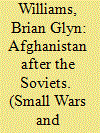

|
|
|
|
|
| Publication |
2014.
|
| Summary/Abstract |
In 1989 the Soviet Union withdrew its forces from Afghanistan leaving the embattled Afghan Communist government of President Mohammad Najibullah to fight against an emboldened mujahideen insurgency. Most experts expected a quick mujahideen victory once the Soviets were no longer directly involved in counterinsurgency operations in support of the Afghan government. But in the spring of 1989 the Afghan Communists beat the odds and defeated a mujahideen rebel offensive designed to capture the eastern city of Jalalabad. This proved to be a turning point, and for the next three years the Najibullah regime held out against the mujahideen 'freedom fighters'. In fact the Afghan Communist regime actually outlasted its sponsor the Soviet Union. The reasons for this remarkable achievement can be traced, in part, to ethnic-tribal divisions among the quarreling mujahideen parties and the Afghan government's ability to exploit them. This largely untold story has obvious implications for understanding the future of post-Karzai Afghanistan, tribalism, ethnicity, and foreign sponsorship in post-US Afghanistan. This article will explore the reasons for the resilience of the Najibullah Communist government and then assess possible implications for a post-2014 Afghan government.
|
|
|
|
|
|
|
|
|
|
|
|
|
|
|
|
| 2 |
ID:
134168
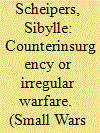

|
|
|
|
|
| Publication |
2014.
|
| Summary/Abstract |
This article argues that the history of irregular warfare provides a valuable analytical and critical perspective for the study of counterinsurgency campaigns and counterinsurgency doctrine. A focus on the history of irregular warfare highlights the close relationship between warfare in Europe and in the colonies. Moreover, it enables us to identify more exactly the intersection of multiple factors that lead to an escalation of violence in small wars. Finally, it also sheds light on the lack of strategic reflection on the use of irregular auxiliaries that is characteristic for many counterinsurgency campaigns.
|
|
|
|
|
|
|
|
|
|
|
|
|
|
|
|
| 3 |
ID:
134172


|
|
|
|
|
| Publication |
2014.
|
| Summary/Abstract |
A common criticism levelled at successive governments of the Republic of Ireland during the Northern Ireland 'Troubles' was their alleged inactivity in the face of a ferocious Provisional IRA campaign. Such criticisms were based in large part on the perception of the southern state as a supply base for militant republicanism. The Republic was undoubtedly a formidable logistics hinterland for such militants. However, criticisms of the reactions of authorities in the south are unfair. This article considers the explosives capabilities of the IRA during the first six years of their campaign. It does so with reference to their attempts to obtain commercial explosives as well as measures employed by them to obtain homemade explosives. The article also considers countermeasures employed by the southern government and reveals the extent to which they sought to shut down IRA capabilities in the south. It is argued that, ultimately, the IRA's campaign in this regard could only be contained and never unilaterally halted.
|
|
|
|
|
|
|
|
|
|
|
|
|
|
|
|
| 4 |
ID:
134175
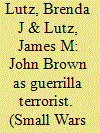

|
|
|
|
|
| Publication |
2014.
|
| Summary/Abstract |
John Brown is usually not considered to have been a terrorist, and even recent analyses of his activities consider him to be a guerrilla fighter or insurgent in his activities in Kansas. Brown, however, meets the criteria of a terrorist more than a guerrilla fighter when his activities in the Kansas Territory are considered. His raid on Harpers Ferry, however, is more in line with guerrilla operations or insurgent activities.
|
|
|
|
|
|
|
|
|
|
|
|
|
|
|
|
| 5 |
ID:
134169
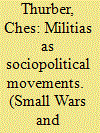

|
|
|
|
|
| Publication |
2014.
|
| Summary/Abstract |
The Shia militia has emerged as one of the most powerful and important actors in the Middle East security environment. Despite this trend, they remain poorly understood by scholars and policymakers alike. This article seeks to expand our understanding of the militia as a type of non-state armed group through an examination of Shia militia movements in Iraq between 2003 and 2009. More than simply warlords, paramilitaries, or foreign proxies, Shia militias in Iraq enjoyed substantial popular legitimacy, pursued a broad social and political agenda, and participated actively in the formal institutions of the state. Understanding the triangular relationship between the militia, the state, and the population is essential in explaining the rise and fall of the Shia militias during the US occupation as well as in developing strategies to deal with their most recent resurgence
|
|
|
|
|
|
|
|
|
|
|
|
|
|
|
|
| 6 |
ID:
134173
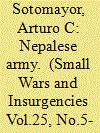

|
|
|
|
|
| Publication |
2014.
|
| Summary/Abstract |
Can peacekeeping participation help reform military institutions in democratizing states? Drawing on evidence from Nepal - one of the world's largest troop contributors to UN peacekeeping operations - this essay illustrates that participation in peace missions can sometimes undermine security sector reform and deteriorate civil-military relations. Furthermore, this analysis shows that peacekeeping participation will not necessarily reorient troops away from their conventional internal roles (such as counterinsurgency) or improve civilian control over the armed forces. Hence, civilians can lose control over soldiers just as frequently when they are deployed overseas as when they are at home.
|
|
|
|
|
|
|
|
|
|
|
|
|
|
|
|
| 7 |
ID:
134176
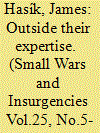

|
|
|
|
|
| Publication |
2014.
|
| Summary/Abstract |
Within the framework of classical theory, the joint US Army-Marine field manual Counterinsurgency (FM 3-24) described an ambitious set of skills required for success against guerrillas. But if counterinsurgency, as FM 3-24 describes it, is 'the graduate level of warfare', then these two military services have been for years systematically failing to train their talent in the appropriate fields. In today's small wars, NCOs serve as modern-day Mounties, and consequently require at least a modest undergraduate education in armed good governance.
|
|
|
|
|
|
|
|
|
|
|
|
|
|
|
|
| 8 |
ID:
134174
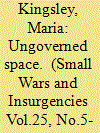

|
|
|
|
|
| Publication |
2014.
|
| Summary/Abstract |
The Ecuadorian state has long been absent from the regions along its northern border with Colombia. I argue that this lack of state presence has allowed non-state armed groups and criminal organizations space to not only operate from these areas, but also, to challenge and change the relationship between local populations and the Ecuadorian state. After reviewing theoretical approaches to concepts of changing security paradigms and ungoverned space, the article details the conditions that have allowed armed groups, specifically the FARC, to take advantage of the lack of state presence along Ecuador's northern border.
|
|
|
|
|
|
|
|
|
|
|
|
|
|
|
|
| 9 |
ID:
134171
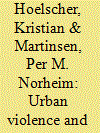

|
|
|
|
|
| Publication |
2014.
|
| Summary/Abstract |
Despite problems of violence domestically, Brazil has played a key leadership role as part of MINUSTAH peacekeeping operations in Haiti since 2004. This article addresses how Brazil's international military engagement is shaping domestic approaches to urban security, and what may be the implications of the use of military strategies, operations, and norms to address issues of public security in Brazilian cities. It is argued that current approaches toward urban security employing military-trained peacekeepers actually represent a continuation of old paradigms, yet these recent militarised approaches are likely evolving into newer and potentially more accountable forms by constraining indiscriminate use of force and establishing a positive state presence in marginal urban areas. As such, the article connects long-established issues of dealing with urban violence in Latin America with ongoing debates in the United States and beyond about post-counterinsurgency approaches to increasingly urban conflict settings. It reflects on potential lessons to be learned from the Latin American perspective, while showing also how these have changed over the last decade. The article concludes that despite the potential utility of force in some urban conflict settings, this approach could entail a normative shift towards legitimising forceful containment of violence, and hinder democratic consolidation in Brazil.
|
|
|
|
|
|
|
|
|
|
|
|
|
|
|
|
|
|
|
|
|